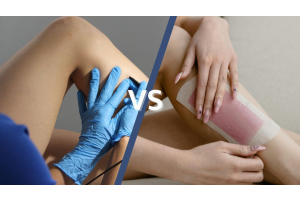Permanent Hair Removal vs. Permanent Hair Reduction
Electrolysis – not laser – is the only hair removal method approved by the F.D.A. for permanent hair removal. Read on to find out why electrolysis is universally successful, while laser hair removal does not work for everybody.
Why doesn’t laser work for everyone?
Electrolysis permanently removes hair regardless of hair type or skin type, but the same is not true of laser hair reduction. To understand why laser doesn’t work for everyone, one first has to understand the basics of laser hair removal technology. Laser hair removal works by sending concentrated light beams into hair follicles so as to damage the root of the hair and reduce its ability to produce hair. The laser’s light targets melanin, a pigment that gives skin and hair its color. It is the melanin-related parameter that limits laser’s efficacy and keeps it from being the right hair removal method for everybody. This is due primarily to two things. First, since laser depends on melanin to recognize hair, it is largely ineffective at removing light hair (white hair, blonde hair, grey hair, red hair, fuzz or peach hair etc.), which does not contain enough melanin for laser to have much of an (or any) impact. The second reason that the melanin factor presents an issue is that dark skin gets its color from melanin too. This means that when treated with laser, melanin in the skin absorbs much of the light Instead of the hair, which can cause burns. For these reasons, laser hair reduction works best on people with light skin and dark hair, but is often not the preferred method of hair removal for other combinations of skin and hair color, like light hair/light skin, light hair/dark skin, and dark hair/dark skin. It is also the reason for which laser centers can only claim permanent hair reduction, and not permanent hair removal.
Why is electrolysis suitable for all hair/skin types?
Unlike laser, electrolysis works by inserting a thin filament into the hair follicle, delivering a small amount of heat to the root of the hair and damaging it so it can no longer produce a hair follicle. A specialist – not a machine – inserts these filaments (commonly referred to as “probes”), so electrolysis can be performed on anybody regardless of hair or skin type, and it is equally effective for everyone.
Additional benefits to choosing electrolysis over laser
In addition to being effective at permanently removing unwanted hair, there are lifestyle benefits to choosing electrolysis – primarily, the ability to continue enjoying outdoor activity without worrying about getting a tan. Because getting a tan means increasing melanin production in the skin, those undergoing the laser hair removal process are discouraged from spending time in the sun before they finish with treatment. Since skin color does not impact the efficacy of electrolysis, no such lifestyle restrictions are imposed.
Finally, I will transition to additional limitations of laser hair removal. For example, it cannot do very delicate shaping of hair, such as eyebrow shaping. Since electrolysis does not depend on melanin, it can precisely shape eyebrows and also treat delicate hairs like mole hair (after you get a letter from your doctor stating the mole is benign).
To sum up, even though electrolysis has been around for nearly 150 years and new technologies such as lasers have emerged, electrolysis is the only method approved by the FDA for permanent hair removal since it can do things that laser simply cannot. That is why electrolysis will be around for a long time to come.
If you’d like to find out more about which hair removal method is right for you, schedule a free consultation at our NYC office in midtown Manhattan, open from 11am-8pm seven days a week. Book online at niosspa.com or by phone, 212-863-9058.






